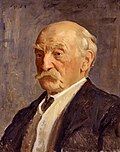Thomas Hardy
Thomas Hardy OM (2 June 1840 – 11 January 1928) was an English novelist and poet. In the U.K. Hardy is generally thought to be one of the greatest figures in English literature. He lived in the Victorian era.
Early life
Thomas Hardy was born in Upper Bockhampton near Dorchester, Dorset. His father was a stonemason. His mother had read a lot. She added to his formal education. Hardy trained as an architect in Dorchester before moving to London to get a job. He won prizes from the Royal Institute of British Architects and the Architectural Association.
Career
Hardy wrote a small number of novels which earned him a high reputation in his lifetime. These include Tess of the d'Urbervilles, The Mayor of Casterbridge and Far from the Madding Crowd. After the publication of Jude the Obscure in 1895 Hardy gave up novel writing but continued to write poetry including an epic poem called The Dynasts. Hardy set his novels in South West England, calling it 'Wessex'. He invented names for the towns, e.g. "Casterbridge" is Dorchester in Dorset. Hardy died in Dorchester. His ashes are buried in Westminster Abbey.
Thomas Hardy Media
"The Hardy Tree", a Great Tree of London in Old St Pancras churchyard in London, growing between gravestones moved while Hardy was working there. The tree fell in December 2022.
Thomas Hardy's birthplace and cottage at Higher Bockhampton, where Under the Greenwood Tree and Far from the Madding Crowd were written
View of the River Frome from the bridge at Lower Bockhampton. In Tess of the d'Urbervilles the lowland vale of the river is described as the Vale of the Great Dairies, in comparison to Tess's home, the fertile Vale of Blackmore, which is the Vale of Little Dairies.
A major location of The Return of the Native as part of Hardy's fictional Egdon Heath
Thomas Hardy by Walter William Ouless, 1922
A portrait of Thomas Hardy in 1923 by Reginald Eves
Thomas Hardy aged 70, by William Strang
The title page from a first edition of Far from the Madding Crowd (1874)










